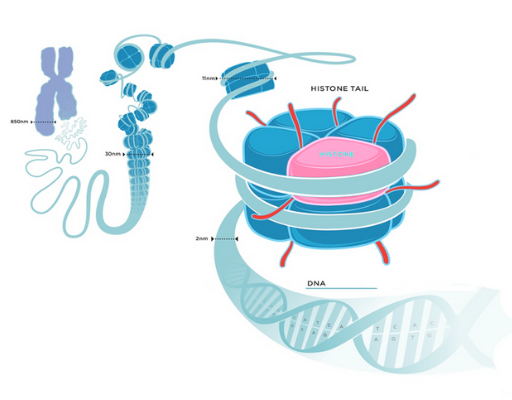Finding new methods to treat Diffuse Midline Glioma
Fast facts
- Official title: Understanding the role of PRC2 deregulation in diffuse midline glioma (DMG; aka DIPG): novel strategies to inhibit EZH2 function
- Lead researcher: Dr Adrian Bracken
- Where: Trinity College Dublin
- When: March 2018 – February 2021
- Cost: £109,263 over three years. This project is co-funded with Worldwide Cancer Research
- Research type: Paediatric, DMG/DIPG (High Grade), Academic
Dr Adrian Bracken and his research team at Trinity College Dublin aim to develop new methods to treat the type of diffuse midline glioma (DMG) that was formerly known as Diffuse Intrinsic Pontine Glioma (DIPG)*.
What is it?
Within every cell, DNA is wrapped around special proteins called histones. This DNA-protein complex, known as chromatin, packages DNA and protects it from tangling and getting damaged (see image below).
Chromatin not only permits a large amount of DNA to fit in the cell, but it also helps regulate gene activity. A number of different chemical tags can be added to histones, and these modifications indirectly control which genes are turned on and off.
The chemical tags are attached to very specific sites on the histone proteins. If these sites are altered or mutated, the tags can no longer be added. As a result, gene activity gets disturbed, and the wrong genes are turned on in a cell. Such changes can cause serious diseases, including various types of cancer.
Previous research has found that a mutation called H3K27M causes the devastating childhood cancer DIPG. This mutation alters an important part of the histone H3 protein to which the chemical tags are normally added. H3K27M occurs in over 80% of children diagnosed with DIPG. However, it was unclear how this mutation causes normal cells to become cancerous.

DNA – Chromatin interactions
Here you can see DNA wrapping around the chromatin complexes. The chromatin complexes then organise into chromosomes. The chemical tags can be seen in red. (Image credit: Dr David Michod, UCL)
The aim of the research team, led by Dr Bracken, was to study how H3K27M alters the normal biology of the cell to promote tumour development. These discoveries will allow researchers to understand how to reverse these changes in order to slow cancer growth, or ultimately stop growth entirely.
Why is it needed?
Diffuse midline gliomas, formerly known as DIPG, are highly aggressive brain tumours found at the base of the brain. DIPG is the second most common type of primary, high grade brain tumour occurring in children. DIPG is difficult to treat as the tumour grows in a dispersed manner and invades healthy tissue of the brainstem, making surgical removal of the tumour impossible. Radiation therapy is the standard treatment, but it’s not a cure and only serves to stabilise the symptoms temporarily. The five-year survival rate of DIPG is less than 1%, making further research into this tumour vital.
Who will it help?
This research project will help children with diffuse midline gliomas. It will lay the foundation for subsequent clinical trials to effectively treat this highly aggressive cancer.
Key findings
The researchers have developed a new model of DIPG* which enabled them to study early stages of the tumour development.
H3K27M was found to stop the activation of genes required for normal development of brain stem cells.
Stem cells carrying the H3K27M mutation fail to develop into mature brain cells. Instead, they continue dividing and eventually give rise to tumours.
The researchers reversed the changes caused by H3K27M using drugs that inhibit a chromatin-associated protein EZH2.
Future work
The team has identified all the proteins that interact with EZH2 in cancer cells. These results will be used to search for other targeted drugs that can be used in the treatment of DIPG.
This grant, that was co-funded with Worldwide Cancer Research, has now come to completion. Happily, the team have separate funding to pursue the new avenues of investigation that were identified.
*Following the 2016 revision to WHO classification, this tumour is now known clinically as “Diffuse Midline Glioma- Pontine Location H3 K27M.”
Research is just one other way your regular gift can make a difference
Research is the only way we will discover kinder, more effective treatments and, ultimately, stamp out brain tumours – for good! However, brain tumours are complex and research in to them takes a great deal of time and money.
Across the UK, over 100,000 families are facing the overwhelming diagnosis of a brain tumour and it is only through the generosity of people like you can we continue to help them.
But, by setting up a regular gift – as little as £2 per month – you can ensure that families no longer face this destructive disease.